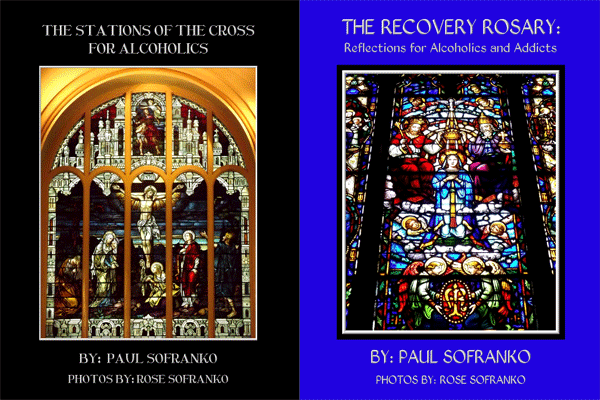
Go into any modern bookstore or go online to any major bookseller and you will find oftentimes large self-help sections. Look closer and you can narrow your search down to self-help books for alcoholics and drug addicts.
Look even closer and you might find a book here or there for Catholics suffering from these afflictions. Into all this comes Paul Sofranko with two small books, “The Recovery Rosary: Reflections for Alcoholics and Addicts” and “Stations of the Cross for Alcoholics.”
Sofranko, a recovering alcoholic himself, has added one more element to the whole scheme of fighting addiction — hope. While many or even most self-help books suggest that we are the only ones capable of fixing our brokenness simply by reading the book, Sofranko elevates the place of prayer in the healing process and reminds readers of the necessity of relying on God for the grace to overcome our addictions.
Relying on God and His mercy is primary to our understanding of our place in a fallen creation and unmatchable in pointing us in the direction of healing.
Sofranko offers the standard sets of prayer, like any good book on the rosary or the Stations of the Cross, but he includes commentary, which aids in the understanding of the purpose and function of the prayer. Moreover, Sofranko centers his commentaries on the problem of addiction.
In “The Recovery Rosary,” he likens recovery to the journey of Christ within the Passion — the courage needed to give up the addictive substance or alcohol is the same kind of courage Christ used to avoid the temptation and proceed to His suffering. Just like the scene in the Garden when Jesus stepped away from the disciples: “He advanced a little and fell prostrate in prayer, saying, “My Father, if it is possible, let this cup pass from me; yet, not as I will, but as you will” (Matt 26:39).
Sofranko writes: “Being a Christian isn’t about accepting Jesus Christ as Lord and Savior and then having a life that is all butterflies and buttercups. It’s humbling yourself to the painful reality that there is a God and you are not Him and that you may have to live according to ways that are contrary to your natural tendencies, political and social beliefs and other peer-pressure situations.”
Living according to God’s will is the kind of advice that is good for all of us, addicted as we all are to sin, consumerism, partisan politics and national and cultural boundaries. God’s will takes us outside ourselves and allows us the natural freedom of surrender that comes from giving our lives to Him.
Like “The Recovery Rosary,” “Stations of the Cross for Alcoholics” follows the journey of the Passion in a point-by-point or event-by-event kind of way, mirroring the recognition of the addict or the alcoholic that something is wrong, that the way of living is not the way that God wants us to live, and the slow, painful turn toward the clean life and freedom.
For alcoholics, the path to sobriety is a life-long one, Sofranko intones, the weight of which is beyond any alcoholic’s own strength. Like the promise of the Resurrection as Christ stumbled along the path to Golgotha, the path to the fact of sobriety is as burdensome and fraught with obstacles and pitfalls.
Sofranko writes: “Crushed by the weight of the suffering, crushed by the enormity of the task, crushed by a promise that seems hard to achieve, a person falls. And crushed by the guilt over the failure to remain clean and sober, the temptation to remain fallen looms.”
Just as Simon of Cyrene helped carry the cross and Veronica cleaned His face, Christ can help the recovering alcoholic get up and move along. Our own journey, even without alcoholism or substance abuse, can be as perilous and the advice given by Sofranko in these two wonderful books is rooted directly in Holy Scripture; in other words, it’s good for all of us and both books are excellent, easy, thought-provoking reads.
– – –
Robert Curtis, a life-professed Lay Dominican, is the author of 17 books, holds a master’s in creative writing, teaches composition at the University of Phoenix and creative writing at Rio Salado College.





